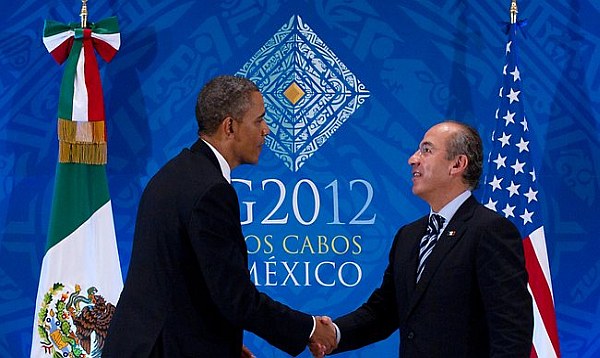Los Cabos, Mexico - The United States and eight other countries on Monday welcomed Mexico into talks aimed at reaching an Asia Pacific free trade agreement, but continued to mull over Canada and Japan's seven-month-old bids to join the negotiations.
"We are delighted to invite Mexico, our neighbor and second-largest export market, to join the (Trans-Pacific Partnership) TPP negotiations," US Trade Representative Ron Kirk said in a statement after a meeting between US President Barack Obama and Mexican President Felipe Calderon at the G-20 summit in Los Cabos, Mexico.
The decision to accept Mexico's application was jointly made by the nine countries currently negotiating the TPP pact - the United States, Australia, New Zealand, Peru, Chile, Singapore, Malaysia, Vietnam, and Brunei, US officials said.
Calderon, nearing the end of his six-year presidential term, called it "a great piece of news" that would help Mexico expand its economy and create more jobs at a time when some other countries are facing slowdowns.
"This is one of the free trade initiatives that's most ambitious in the world and would foster integration of the Asia Pacific region, one of the regions with the greatest dynamism in the world," Calderon said.
The proposed TPP agreement is part of a broader US strategy to link its economy to fast-growing markets in the Asia Pacific region. The countries involved in the talks are pursuing an agreement that has higher standards in areas such as labor, environment, and intellectual property rights protections than previous trade accords and also reduces regulatory barriers to trade.
"We look forward to working with Mexico as we seek to conclude a comprehensive and balanced package, taking into account the diversity of our levels of development," New Zealand Trade Minister Tim Gloser said in a statement.
Mexico, Canada, and Japan last November expressed interest in joining the TPP talks, when Obama hosted a regional economic summit in Honolulu. The nine current TPP members have been discussing the countries' applications since.
 |
Japan's possible entry has raised the most concern in the United States because of doubts that Tokyo is really prepared to significantly open its auto, agriculture, and services markets to foreign competitors.
Canada's application has been stalled by lingering questions over its willingness to negotiate changes to its agricultural supply management programs.
Canadian Prime Minister Stephen Harper signaled on Monday he also expected good news on his country's bid. "We're delighted that the Americans and others have indicated an interest in seeing Canada join the Trans-Pacific Partnership," Harper said.
Eric Farnsworth, vice president at the Council of Americas, a US business group, said he thought there potentially could still be a decision on Canada "within the next few days," while it would take longer for one on Japan.
Mexico and Canada already are partners with the United States in the North American Free Trade Agreement, which went into force in 1994. Since then, their economies have become so integrated that it is almost more difficult for the US "to negotiate a trade agreement that doesn't include Canada and Mexico than to negotiate one that does," Farnsworth said.
The decision to accept Mexico shows there's an "open door" to other applicants willing to accept the high level of commitments envisioned under the pact, he added.
Kirk's office said the Obama administration would shortly notify Congress of its intent to begin trade talks with Mexico.
The nine current TPP countries will hold their 13th round of talks in early July in San Diego, California. Business groups are hoping for a deal by the end of the year, but there are many difficult issues left to resolve.


